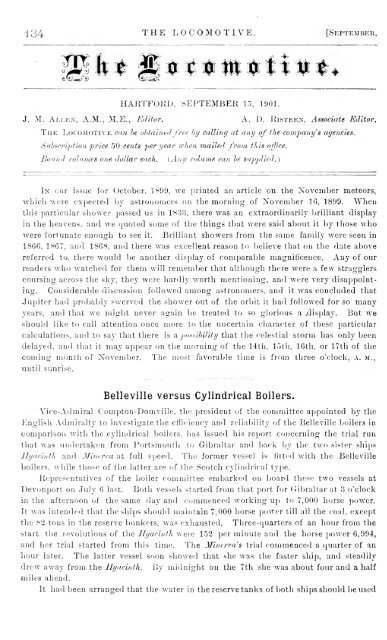The Locomotive - Lighthouse Survival Blog
The Locomotive - Lighthouse Survival Blog
The Locomotive - Lighthouse Survival Blog
You also want an ePaper? Increase the reach of your titles
YUMPU automatically turns print PDFs into web optimized ePapers that Google loves.
134 THE LOCOMOTIVE. [September,<br />
H$f $ii tit<br />
HARTFORD, SEPTEMBER 15, 1901.<br />
J. M. Allen, A.M., M.E., Editor. A. D. Risteen, Associate Editor.<br />
<strong>The</strong> <strong>Locomotive</strong> can be obtained free by calling at any of the company's agencies.<br />
Subscription price 50 cents per year when mailed from this office.<br />
Bound volumes one dollar each. (Any volume can be supjdied.)<br />
In cur issue for October, 1899, we printed an article on the November meteors,<br />
which were expected by astronomers on the morning of November 16, 1899. When<br />
this particular shower passed us in 1833, there was an extraordinarily brilliant display<br />
in the heavens, and we quoted some of the things that were said about it by those who<br />
were fortunate enough to see it. Brilliant showers from the same family were seen in<br />
1866, 1867, and 1868, and there was excellent reason to believe that on the date above<br />
referred to, there would be another display of comparable magnificence. Any of our<br />
readers who watched for them will remember that although there were a few stragglers<br />
coursing across the sky, they were hardly worth mentioning, and were very disappoint-<br />
ing. Considerable discussion followed among astronomers, and it was concluded that<br />
Jupiter had probably swerved the shower out of the orbit it had followed for so many<br />
years, and that we might never again be treated to so glorious a .display. But we'<br />
should like to call attention once more to the uncertain character of these particular<br />
calculations, and to say that there is a jiosxibUity that the celestial storm has only been<br />
delayed, and that it may appear on the morning of the 14th, 15th, 16th, or 17th of the<br />
coming month of November. <strong>The</strong> most favorable time is from three o'clock, a. m.,<br />
until sunrise.<br />
Belleville versus Cylindrical Boilers.<br />
Vice-Admiral Compton-Domville. the president of the committee appointed by the<br />
English Admiralty to investigate the efficiency and reliability of the Belleville boiler3 in<br />
comparison with the cylindrical boilers, has issued his report concerning the trial run<br />
that was undertaken from Portsmouth to Gibraltar and back by the two sister ships<br />
Hyacinth and Minerva at full speed. <strong>The</strong> former vessel is fitted with the Belleville<br />
boilers, while those of the latter are of the Scotch cylindrical type.<br />
Representatives of the boiler committee embarked on board these two vessels at<br />
Devonport on July 6 last. Both vessels started from that port for Gibraltar at 3 o'clock<br />
in the afternoon of the same day and commenced working up to 7,000 horse power.<br />
It was intended that the ships should maintain 7,000 horse power till all the coal, except<br />
the 82 tons in the reserve bunkers, was exhausted. Three-quarters of an hour from the<br />
start the revolutions of the Hyacinth w ere 152 per minute and the horse power 6,994,<br />
and her trial started from this time. <strong>The</strong> Minerva's trial commenced a quarter of an<br />
hour later. <strong>The</strong> latter vessel soon showed that she was the faster ship, and steadily<br />
drew away from the Hyacinth. By midnight on the 7th she was. about four and a half<br />
miles ahead.<br />
It had been arranged that the water in the reserve tanks of both ships should be used
















